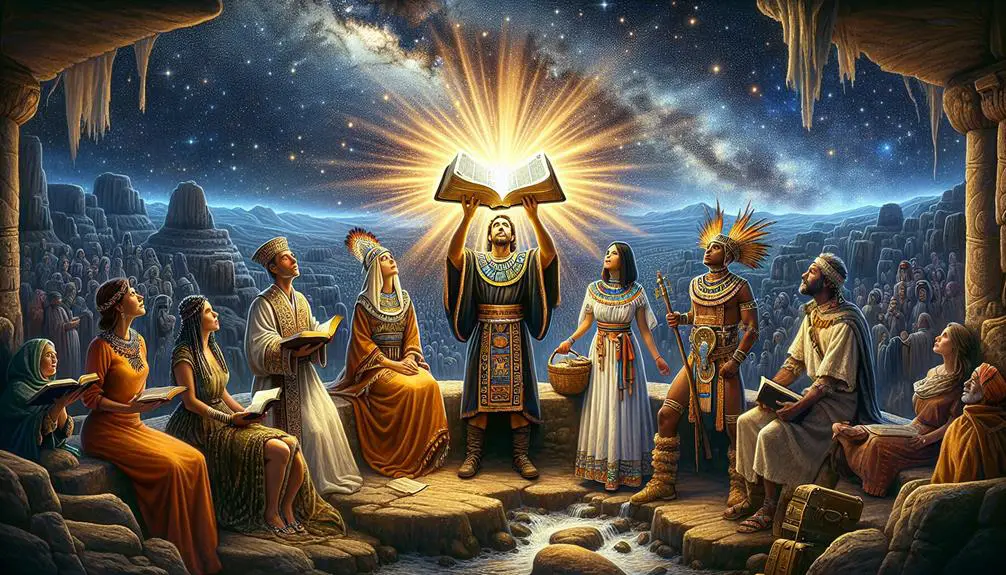Journey into the biblical essence of 'dwelleth' to uncover its divine significance and its role in connecting humanity with the omnipresent God.

What Does Dwelleth Mean in the Bible
As you embark on a journey through the dense forest of Biblical terminology, you'll find that 'dwelleth' is not merely a relic of language, but a window into the divine. This term, rooted deeply in scripture, offers a nuanced glimpse into the relationship between the divine and the human, the eternal presence of God, and the spiritual dwelling among us.
Exploring its use across different books—from the poetic verses of Psalms to the profound narratives of the New Testament—unveils layers of meaning that are pivotal to understanding the omnipresence of God and the human-divine relationship. You're on the cusp of uncovering how this ancient term shapes our modern spiritual understanding, inviting a closer look at its significance.
Key Takeaways
- "Dwelleth" symbolizes a permanent, spiritual communion between the divine and the faithful, emphasizing an unbreakable bond.
- It originates from Old English "dwelian," evolving from meaning to lead astray to signifying a spiritual residence.
- In biblical texts, "dwelleth" reflects God's constant presence and support, underscoring divine love and commitment.
- The term poses translation challenges, highlighting the importance of understanding its nuanced evolution to grasp its spiritual significance.
Origins of Dwelleth

The term 'dwelleth,' deeply rooted in biblical language, originates from the Old English verb 'dwelian,' which means to lead astray or to delay, though its usage evolved to signify living or staying in a place. You'll find that this transformation is a prime example of language evolution, especially within the context of religious texts. As languages evolve, the meanings of words can shift dramatically, reflecting changes in culture, society, and even religious understanding.
In the case of 'dwelleth,' its journey from a word implying error or delay to one denoting residence or permanence highlights the fluid nature of language. This evolution isn't merely of linguistic interest; it poses significant translation challenges. Translators of biblical texts have the daunting task of conveying not just the literal meaning of words but their connotative shades as well. This is particularly challenging with a word like 'dwelleth,' whose transition in meaning over centuries can complicate understanding for contemporary readers.
You must appreciate the meticulous work translators do, navigating these shifts in language to provide accurate and meaningful translations. The evolution of a single term like 'dwelleth' exemplifies the broader challenges faced in translating ancient texts into modern languages. This process isn't just about finding equivalent words but about bridging cultures, epochs, and philosophies. As a scholar or a curious reader, understanding these nuances enriches your comprehension of biblical texts and deepens your appreciation for the intricate relationship between language and meaning.
Dwelleth in Psalms

Exploring the use of 'dwelleth' within the Psalms offers a unique lens through which you can further appreciate the term's evolution and its profound implications in biblical narratives. The Psalms, known as musical prayers, showcase an array of emotions from despair to jubilation, often emphasizing the close, personal relationship between the divine and the individual. The word 'dwelleth' enriches this relationship by denoting a sense of abiding presence, not just a fleeting visitation.
The application of 'dwelleth' in Psalms interpretation underscores a spiritual permanence and constancy. It suggests that the divine presence isn't merely passing through but has chosen to reside or settle in a particular place or within an individual. This concept is pivotal for understanding the depth of comfort and assurance the Psalms aim to convey.
Psalm Reference |
Context |
Implication of 'Dwelleth' |
|---|---|---|
Psalm 23:6 |
Assurance of God's presence |
Indicates an eternal, unchanging residence with God |
Psalm 91:1 |
Protection under God's sovereignty |
Symbolizes intimate and constant protection |
Psalm 119:114 |
Seeking refuge in God |
Emphasizes God as a permanent shelter |
These examples illustrate how 'dwelleth' functions as a powerful term that deepens the reader's understanding of the divine-human relationship. It's not just about God being present in a general sense; it's about a profound, enduring communion. As you delve into the Psalms, you're invited to reflect on this enduring presence, making the ancient text resonate with contemporary spiritual journeys.
Symbolism and Context

Delving into the symbolism and context around 'dwelleth' reveals its multifaceted significance in biblical texts, offering a richer understanding of its spiritual and thematic layers. In the Bible, 'dwelleth' isn't just a term used to describe a physical living situation; it's a living metaphor for spiritual communion and a profound sense of belonging. This word conveys a deeper spiritual reality, suggesting not just a temporary stay but a permanent, unbreakable bond between the divine and the faithful.
The cultural interpretations of 'dwelleth' further enrich its meaning, revealing how historical contexts shaped its usage and understanding. In biblical times, the concept of dwelling was deeply intertwined with notions of protection, peace, and presence. To say that God 'dwelleth' with someone didn't just imply God's temporary visitation; it signified God's constant presence and sustaining support. This idea resonates with the notion of an omnipresent God who's always accessible to the faithful, transcending physical boundaries to offer spiritual shelter and guidance.
Moreover, 'dwelleth' can be seen as a symbol of commitment and covenant. It denotes a sacred space where divine promises are fulfilled and spiritual growth is nurtured. This term, therefore, carries a profound significance, embodying the essence of a relationship built on trust, faith, and divine love.
Understanding 'dwelleth' within these symbolic and cultural frameworks allows for a deeper appreciation of its role in conveying the spiritual depth and complexity of biblical narratives. It's not just a word; it's a key to unlocking the spiritual richness embedded within the biblical text.
Comparisons With Dwells

CURRENT SUBTOPIC: 'Comparisons With Dwells'
In comparing 'dwelleth' with 'dwells', it's essential to consider how each reflects distinct nuances of permanence and presence in biblical texts. These two forms, while seemingly similar, encapsulate the depth of language evolution and grammatical differences that offer insights into the interpretive richness of scripture.
You'll find that 'dwelleth' often conveys a sense of ongoing, unending presence. It's not just about residing in a place temporarily but about a continuous, enduring inhabitation. This archaic form, rooted in the King James Version of the Bible, invites readers into a deeper contemplation of divine permanence.
On the other hand, 'dwells'—more commonly used in contemporary English—carries a similar meaning but without the same depth of perpetual presence. It suggests living or staying as a resident, which, while still significant, doesn't automatically imply the everlasting nature that 'dwelleth' does.
To clarify these nuances, consider the following table that compares 'dwelleth' and 'dwells' across several dimensions:
Aspect |
Dwelleth |
Dwells |
|---|---|---|
Time Frame |
Suggests an eternal, unchanging state |
Implies a present, possibly temporary, residence |
Language Period |
Archaic, used in older translations like KJV |
Modern, found in contemporary texts |
Emotional Tone |
Evokes a sense of awe and timeless presence |
Conveys a straightforward sense of habitation |
Usage |
More common in poetic or symbolic contexts |
Used in everyday, literal descriptions |
Understanding these distinctions helps you appreciate the layers of meaning and the role of language evolution in shaping our interpretation of biblical texts.
God's Omnipresence

Having considered the nuanced differences between 'dwelleth' and 'dwells,' let's now turn our attention to the concept of God's omnipresence as an essential aspect of divine permanence in the Bible. This concept underlines the theological assertion that God exists beyond the confines of physical space and time, embodying both universal omnipotence and spatial transcendence.
You might ponder how such an abstract concept influences your understanding of the divine. It suggests that God isn't limited by the physical barriers that constrain human existence. Instead, God's presence permeates every corner of the universe, unseen yet omnipresent. This spatial transcendence is crucial in interpreting biblical texts, as it underscores the belief that God's influence and authority are boundless.
The term 'omnipresence' itself encapsulates the idea that God exists everywhere simultaneously. It's a concept that challenges our spatially bound understanding but is central to grasping the full scope of divine omnipotence. This omnipotence isn't just about power in the traditional sense but also about presence. The idea that God can dwell within and around all creation without limitation or constraint speaks to a level of power that defies human comprehension.
In light of this, when scripture references God's dwelling, it's not merely about a physical location or a temporary abode. It's a profound statement about the nature of God's existence and relationship with the universe. God's omnipresence, then, isn't just a theological concept but a fundamental attribute that reflects both universal omnipotence and spatial transcendence, shaping the very fabric of biblical interpretation and understanding.
Human-Divine Relationship

The concept of omnipresence profoundly shapes our understanding of the human-divine relationship, suggesting a connection that transcends physical and temporal boundaries. This relationship, foundational to many biblical narratives, hinges on two pivotal elements: divine encounters and spiritual obedience. These components forge a pathway through which individuals can engage with the divine, irrespective of the constraints imposed by the physical world.
To delve deeper, let's consider three key aspects:
- Divine Encounters: Throughout the Bible, instances of divine encounters serve as pivotal moments that redefine the course of an individual's life. These encounters aren't limited by space or time, illustrating that the divine realm is always within reach. They beckon you to be observant and receptive to the divine presence that dwells among us.
- Spiritual Obedience: Obedience isn't merely about adherence to commandments; it's about aligning one's heart and actions with divine will. This form of obedience signifies a deeper level of engagement with the divine, one that goes beyond the superficial and seeks to harmonize one's life with spiritual principles.
- Perpetual Presence: The omnipresence of the divine suggests that you're never truly alone. This continuous presence invites you to live in a state of constant awareness and communion with the divine, fostering a relationship that's dynamic and evolving.
Understanding the human-divine relationship through the lens of omnipresence encourages you to see beyond the immediate and tangible. It invites you to explore a deeper connection with the divine, characterized by moments of profound encounters and a commitment to spiritual obedience.
New Testament Insights

As you explore the New Testament, you'll find that 'dwelleth' gains a nuanced, spiritual dimension, especially in the context of the believer's relationship with the divine.
It's pivotal in understanding how faith is both expressed and experienced through the indwelling of the Spirit.
This concept underscores the transformative role of 'dwelleth' in the believer's life, bridging the human and divine in a profound union.
Spiritual Indwelling Explained
Why does the concept of spiritual indwelling occupy a central place in New Testament theology? This notion isn't just a peripheral idea; it's foundational to understanding how believers relate to God. Spiritual indwelling transforms the believer into an interior sanctuary, a space where divine presence isn't just visiting—it's a permanent resident. This spiritual habitation signifies a profound, intimate relationship between the divine and the human.
Consider these three insights:
- Interior Sanctuary: The believer's heart becomes a holy place, hosting God's Spirit.
- Spiritual Habitation: This indwelling emphasizes continuous communion with God.
- Transformation: The presence of God within initiates profound personal transformation, guiding thoughts, actions, and desires.
This framework not only clarifies the depth of God's commitment to humanity but also underscores the believer's sacred role as a living temple.
Dwelleth's Role in Faith
Exploring the concept of 'dwelleth' sheds light on its pivotal role in shaping believers' faith and understanding of divine presence in the New Testament. This term, rich in spiritual nuance, invites you to delve deeper into your personal relationship with God, suggesting a continuous, intimate connection.
Modern interpretations of 'dwelleth' emphasize this ongoing communion, highlighting how cultural influences have shaped our understanding of God's omnipresence. As you reflect on these insights, consider how the notion that God 'dwells' within us challenges and enriches your faith journey.
This idea not only bridges historical and contemporary views but also fosters a deeper, more personal engagement with the divine, encouraging you to embody faith in your daily life.
Reflecting on Dwelleth

Reflecting on 'dwelleth' offers a deeper insight into its profound significance in biblical texts, inviting you to consider how this concept influences personal faith and understanding. The term, rich in its historical context, bridges ancient scriptural expressions with contemporary spiritual life. Delving into dwelleth's etymology and modern interpretations, you uncover layers of meaning that resonate deeply with the human experience of faith.
To grasp the full depth of 'dwelleth,' consider these three aspects:
- Historical Roots: Dwelleth's etymology traces back to ancient languages, revealing a sense of permanence and presence. This historical perspective enriches your understanding, highlighting how the concept of dwelling with God or within oneself has evolved but retained its core essence over millennia.
- Symbolic Interpretations: In modern interpretations, 'dwelleth' transcends its literal meaning to symbolize a spiritual state of being. It suggests an intimate, enduring presence within one's life or community, encouraging a reflection on the nature of your relationship with the divine.
- Personal Reflection: The act of reflecting on 'dwelleth' challenges you to ponder the ways in which you invite and sustain a spiritual presence in your life. It prompts a thoughtful examination of your faith practices and beliefs, encouraging growth and deeper understanding.
Through this analysis, 'dwelleth' emerges not just as an archaic term but as a dynamic concept that continues to inspire and influence. It invites you into a thoughtful exploration of your spiritual journey, enriching your faith with its layered meanings and implications.
Frequently Asked Questions
How Has the Interpretation of "Dwelleth" Evolved in Modern Biblical Translations Compared to Its Original Usage?
In modern biblical translations, the interpretation of 'dwelleth' reflects language evolution and translation methodologies. You'll notice it's often replaced with more contemporary terms like 'lives' or 'resides,' making it accessible to today's readers.
This shift doesn't just highlight linguistic changes; it underscores a deeper understanding of the text's intent and cultural relevance. Scholars have worked diligently to ensure that these translations respect the original message while engaging a modern audience.
Are There Any Significant Theological Debates or Controversies Surrounding the Interpretation of "Dwelleth" in Different Christian Denominations?
Diving into the heart of the matter, you'll find that 'dwelleth' semantics stir up varied interpretations across Christian denominations, sparking theological debates. The crux lies in Scriptural contexts, where each denomination leans on its doctrinal foundations to interpret 'dwelleth.'
This isn't just about words—it's about how presence and indwelling are understood in faith communities. Analyzing these discussions, you'll see they're deeply rooted in tradition, yet open to scholarly dialogue, respecting diverse perspectives.
How Do Non-Christian Religions Interpret or Understand the Concept of "Dwelleth" When Referenced in Interfaith Dialogues?
In interfaith dialogues, you'll find that the concept of 'dwelleth' gains unique interpretations across varying cultural perspectives. Non-Christian religions often approach it with their own theological frameworks, enriching the conversation.
This diversity fosters deeper interfaith understanding, as each tradition brings a distinct lens to the discussion. Analyzing 'dwelleth' from these various viewpoints not only respects all contributions but also highlights the commonalities and differences in spiritual beliefs and practices.
In What Ways Has the Concept of "Dwelleth" Influenced Christian Art, Music, or Literature Throughout History?
You've seen how a single brushstroke can evoke profound emotion; similarly, the concept of 'dwelleth' has deeply influenced Christian art, music, and literature.
Sculptural symbolism in cathedrals captures the divine presence, while choral compositions envelop listeners in a sense of spiritual indwelling.
This artistic expression reflects a scholarly and respectful exploration of dwelling with the divine, weaving a narrative that enriches our understanding of faith and its manifestation through creativity.
Can the Concept of "Dwelleth" Be Found in Any Secular Contexts, and How Is Its Meaning Adapted in Those Scenarios?
You're exploring how 'dwelleth,' with its rich etymology, has been adapted in secular contexts. This term, historically rooted in religious texts, has found its way into broader, non-religious discourse.
In secular adaptations, its meaning often shifts to denote a deep, enduring presence or influence, rather than a literal dwelling. This nuanced usage reflects the term's ability to convey a sense of permanence and significance beyond its original, biblical connotations.
Conclusion
In wrapping up, you've journeyed through the rich tapestry of 'dwelleth' in the Bible, from its ancient roots to its profound symbolisms.
You've seen how it bridges the infinite gap between the divine and the mundane, painting a picture where God's presence is as vast as the universe, yet as intimate as a whisper in the heart.
This exploration not only deepens your understanding of scriptural language but also invites you to reflect on the omnipresent nature of the divine in your life.



Sign up